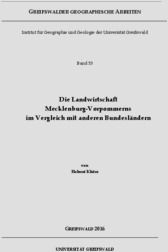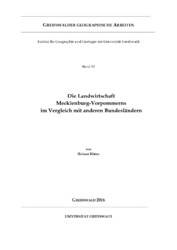| dc.contributor.author | Klüter, Helmut | |
| dc.date.accessioned | 2017-02-02T13:51:30Z | |
| dc.date.accessioned | 2017-06-06T09:17:40Z | |
| dc.date.available | 2017-02-02T13:51:30Z | |
| dc.date.available | 2017-06-06T09:17:40Z | |
| dc.date.issued | 2017-02-02 | |
| dc.identifier.uri | http://hdl.handle.net/11858/00-1735-0000-002C-AF0D-7 | |
| dc.description.abstract | Trotz relativ guter physiogeographischer Rahmenbedingungen fällt die Landwirtschaft Mecklenburg-Vorpommerns nach Wertschöpfung, Flächenproduktivität, Subventionseffektivität weit hinter die der westlichen Bundesländer zurück. Ursachen sind unter anderem die Inflexibilität und Unproduktivität übergroßer Unternehmen, die Dominanz billiger Massenproduktion und der Verzicht der Großbetriebe auf die Bedienung nachfragestarker Marktsegmente im ökologischen und hochqualitativen Bereich. Die Subventionierung und Privilegierung der großbetrieblich strukturierten Agrarindustrie muss abgebaut, die Förderung innovativer kleiner und mittlerer bäuerlicher Betriebe intensiviert werden. Die Infrastruktur in Ländlichen Räumen muss wachstumsorientiert für Landwirtschaft, Tourismus, hochwertiges Wohnen und seniorenbezogene Dienstleistungen ausgebaut werden. | |
| dc.description.abstract | In spite of relatively good general conditions and good soils, agriculture in Mecklenburg-Vorpom-mern is the only economic sector in the state whose gross value added has not seen a positive development in the last 20 years. Mecklenburg-Vorpommern’s agricultural sector stagnates at a low level and with a productivity of only 613 euros per hectare at 31.7 per cent below the German average. One of the most significant causes for this are the large farming businesses which are specialised in cheap mass production. Low area productivity is a result of inadequate flexibility of the large farming companies when it comes to reacting to market signals. Whilst smaller farms, which dominate agriculture in West Germany, can adjust their productive alignment relatively quickly or diversify to mix their income, large farming businesses try to avoid changes or put them off for as long as possible. The form of production, which is dominated by industrial farming, and the marginalisation of small and medium-sized farms as a result of land speculation and price dumping, cause the federal state of Mecklenburg-Vorpommern regional economic damages of at least € 250 million annually. The subsidisation and privileged treatment of industrial farming has to be cut down on as quickly as possible. We propose a new model of cooperation in rural areas called “Garden of metropolises”. It combines small and medium sized farms, preferably family farms, with tourism, leisure, high quality service, medium and high standard of living. | |
| dc.description.sponsorship | Fraktion Bündnis 90/Die Grünen im Landtag von Mecklenburg-Vorpommern | |
| dc.description.sponsorship | Unternehmerverband MiLaN, Wietzow | |
| dc.language.iso | ger | |
| dc.publisher | Institut für Geographie und Geologie der Universität Greifswald | |
| dc.subject.ddc | 910 | |
| dc.subject.gok | QGB 570 | |
| dc.subject.gok | QER 250 | |
| dc.title | Die Landwirtschaft Mecklenburg-Vorpommerns im Vergleich mit anderen Bundesländern | |
| dc.type | monograph | |
| dc.subject.gokverbal | Mecklenburg-Vorpommern {Geographie} | |
| dc.subject.gokverbal | Agrar- und Forstgeographie {Wirtschaftsgeographie} | |
| dc.identifier.doi | 10.23689/fidgeo-2021 | |
| dc.identifier.ppn | 87016600X | |
| dc.type.version | publishedVersion | |
| dc.rights.holder | Prof. Dr. Helmuth Klüter | |
| dc.subject.free | Landwirtschaft | |
| dc.subject.free | Ländliche Räume | |
| dc.subject.free | Mecklenburg-Vorpommern | |
| dc.title.translated | Agriculture in Mecklenburg-Vorpommern compared with other Federal States of Germany | |
| dc.relation.volume | Greifswalder Geographische Arbeiten; 2016, 53 | |
| dc.description.type | research | |
| dc.description.type | research | |



